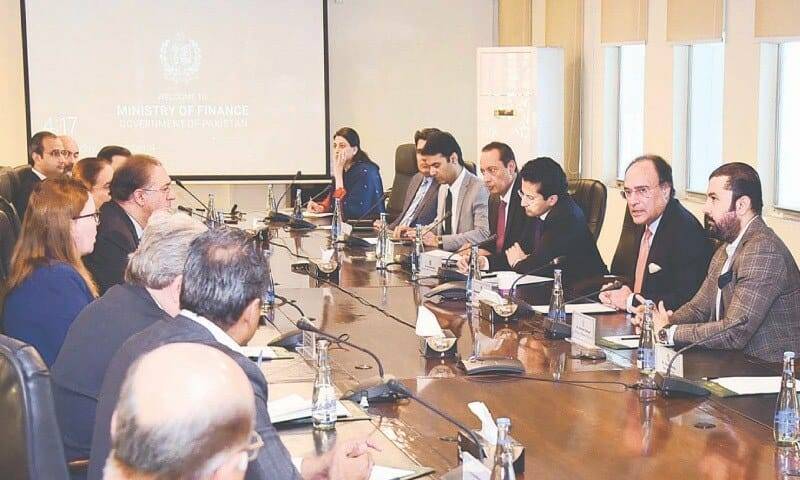Main Points In Hindi (मुख्य बातें – हिंदी में)
-
नई कृषि आयकर कानूनों में देरी: वित्त मंत्री मुहम्मद औरंगजेब ने सिंध, खैबर पख्तूनख्वा और बलूचिस्तान में नए कृषि आयकर कानून को पारित करने में देरी पर असंतोष व्यक्त किया है। यह कानून अंतर्राष्ट्रीय मुद्रा कोष (IMF) के साथ एक समझौते का हिस्सा है।
-
राष्ट्रीय कर परिषद की बैठक: वित्त मंत्री ने एनटीसी की बैठक में कहा कि विभिन्न कर नीतियों पर प्रगति का आकलन करने के लिए हर तीन महीने में बैठकें आयोजित की जानी चाहिए। सिंध के मुख्यमंत्री के साथ कानून पारित करने की प्रक्रिया पर चर्चा करने का भी निर्णय लिया गया है।
-
कर सुधारों और सूचना-साझाकरण का महत्व: बैठक में कर प्रणालियों में सुधार, compliance बढ़ाने, और राजस्व संग्रह में सुधार के लिए संघीय और प्रांतीय अधिकारियों के बीच सहयोग बढ़ाने पर ध्यान केंद्रित किया गया। जीएसटी और कर दरों के सामंजस्य पर भी चर्चा की गई।
-
आवास क्षेत्र के लिए ऋण का प्रवर्तन: मंत्री ने कहा कि सरकार आवास क्षेत्र को डायरेक्ट लोन देने से पीछे नहीं हटेगी और बैंकों को इस क्षेत्र में वित्तीय सहायता बढ़ाने के लिए प्रोत्साहित करेगी।
- राज्य के स्वामित्व वाले उद्यमों का पुनर्गठन: वित्त मंत्री की अध्यक्षता में सीसीओएसओई ने विभिन्न सरकारी संस्थाओं के बोर्डों का पुनर्गठन किया है, जिसमें प्रिंटिंग कॉर्पोरेशन ऑफ पाकिस्तान और पाकिस्तान रेलवे शामिल हैं।
Main Points In English(मुख्य बातें – अंग्रेज़ी में)
Here are the main points from the article:
-
Delay in Agricultural Tax Laws: Finance Minister Muhammad Aurangzeb expressed dissatisfaction with the slow progress of passing new agricultural tax laws by three provinces, which is critical for fulfilling conditions agreed upon with the International Monetary Fund (IMF) as part of a $7 billion extended fund facility.
-
National Tax Council (NTC) Meeting: During an NTC meeting, the Finance Minister reviewed several tax initiatives and proposed that these meetings take place every three months to evaluate progress on various tax policies, marking the first gathering after an 18-month break.
-
Progress of Agricultural Tax Bills: While the Khyber Pakhtunkhwa government has approved the agricultural tax bill, it has not been presented in the assembly. There was no confirmation on whether Sindh or Balochistan has passed their respective bills, leading the Finance Minister to engage with Sindh’s Chief Minister on the issue. Punjab is the only province that has enacted the bill.
-
Collaboration for Tax Collection Improvements: The NTC meeting aimed to foster cooperation among federal and provincial officials to enhance tax systems and compliance, focusing on improved information sharing between the Federal Board of Revenue (FBR) and provincial tax authorities.
- Housing Sector Support: The Finance Minister emphasized the government’s commitment to promote directed loans in the housing sector, urging for incentives that would make housing financing accessible to the public, while addressing concerns about population growth and climate change affecting the housing sector.


Complete News In Hindi(पूरी खबर – हिंदी में)
इस्लामाबाद: वित्त मंत्री मुहम्मद औरंगजेब ने नए कृषि आयकर कानूनों को पारित करने में तीन प्रांतों की देरी पर असंतोष व्यक्त किया है। यह नया कानून 37 महीने की 7 अरब डॉलर की विस्तारित फंड सुविधा के हिस्से के रूप में अंतर्राष्ट्रीय मुद्रा कोष के साथ सहमत शर्तों में से एक है।
वित्त मंत्री ने बुधवार को राष्ट्रीय कर परिषद (एनटीसी) की बैठक के दौरान कई कर पहलों की समीक्षा की, जो 18 महीने के अंतराल के बाद आयोजित की गई थी। मंत्री ने वित्त मंत्रालय से विभिन्न कर नीतियों पर प्रगति का आकलन करने के लिए हर तीन महीने में एनटीसी बैठकें आयोजित करने को भी कहा।
बैठक में भाग लेने वाले एक आधिकारिक सूत्र के अनुसार, वित्त मंत्री ने सिंध, खैबर पख्तूनख्वा और बलूचिस्तान द्वारा कृषि आयकर कानूनों को पारित करने की खराब गति पर असंतोष व्यक्त किया। बैठक में बताया गया कि केपी सरकार ने विधेयक को मंजूरी दे दी है, लेकिन इसे अभी विधानसभा के समक्ष पेश किया जाना बाकी है।
हालाँकि, बैठक में इस संबंध में कोई जानकारी प्रस्तुत नहीं की गई कि सिंध या बलूचिस्तान कैबिनेट ने कृषि-आय कर विधेयक पारित किया है या नहीं। खराब गति को देखते हुए, वित्त मंत्री ने सिंध के मुख्यमंत्री मुराद अली शाह के साथ इस मुद्दे को उठाने का फैसला किया है। पंजाब एकमात्र प्रांत है जिसने प्रांतीय विधानसभा के माध्यम से विधेयक को अधिनियमित किया है।
औरंगजेब का कहना है कि सरकार आवास क्षेत्र को निर्देशित ऋण देने से पीछे नहीं हटेगी
संघीय राजस्व बोर्ड (एफबीआर) ने केवल उन करदाताओं के बारे में जानकारी का खुलासा करने पर सहमति व्यक्त की है जिन्होंने अपने कर रिटर्न में अपनी कृषि आय की सूचना दी है। हालाँकि, एफबीआर प्रांतों के साथ अधिक जानकारी का खुलासा करने में अनिच्छुक है क्योंकि वर्तमान कानून करदाताओं की गोपनीयता की रक्षा करता है।
बैठक के बाद जारी एक आधिकारिक घोषणा में कहा गया कि एनटीसी बैठक में कर सुधारों और सामंजस्य से संबंधित महत्वपूर्ण मामलों पर चर्चा करने के लिए प्रमुख संघीय और प्रांतीय हितधारकों को एक साथ लाया गया।
यह बैठक महासंघ और प्रांतों के बीच हाल ही में हस्ताक्षरित राष्ट्रीय राजकोषीय समझौते के संदर्भ में आयोजित की गई थी, जिसमें कम कर वाले क्षेत्रों, विशेष रूप से रियल एस्टेट, संपत्ति और कृषि आय से पूर्ण कर क्षमता का एहसास करने की आवश्यकता पर जोर दिया गया था।
बैठक का एजेंडा कर प्रणालियों को बढ़ाने, अनुपालन में सुधार और राजस्व संग्रह को बढ़ावा देने के लिए संघीय और प्रांतीय अधिकारियों के बीच सहयोग को बढ़ावा देने पर केंद्रित था। मुख्य चर्चाएँ एफबीआर और प्रांतीय राजस्व अधिकारियों के बीच सूचना-साझाकरण तंत्र को मजबूत करने, डेटा विश्लेषण के लिए उन्नत उपकरणों का लाभ उठाने और कर संग्रह को सुव्यवस्थित करने के लिए डिजिटल समाधान लागू करने के आसपास घूमती रहीं।
प्रांतों में सामान्य बिक्री कर (जीएसटी) को सुसंगत बनाने और बेहतर दक्षता और पारदर्शिता के लिए एकीकृत कर पोर्टल में परिवर्तन के प्रयासों को आगे बढ़ाने पर भी सहमति हुई। बैठक में एकल पोर्टल, कर दरों के सामंजस्य और कर योग्य सेवाओं की एक सहमत सूची पर भी ध्यान केंद्रित किया गया।
आवास ऋण को प्रोत्साहन देना
इस बीच, वित्त मंत्री ने कहा कि सरकार आवास क्षेत्र को निर्देशित ऋण देने से पीछे नहीं हटेगी और इसे जनता के लिए सुलभ बनाने के लिए बैंक के नेतृत्व वाले वित्तपोषण की सुविधा के लिए प्रोत्साहन बनाने का आग्रह किया, एपीपी ने बताया।
“हम निर्देशित ऋण देने की ओर वापस नहीं जाएंगे, जो कि गलत काम था। मंत्री ने अंतर्राष्ट्रीय किफायती, हरित और लचीला आवास सम्मेलन में बोलते हुए कहा, यह विकृतियां पैदा करता है और मध्यम अवधि के लिए इसका प्रभाव पड़ता है।
उन्होंने कहा कि आवास वित्त को बढ़ावा देने के लिए सरकार प्रोत्साहन तंत्र बनाने पर ध्यान केंद्रित करेगी। यह दृष्टिकोण बैंकों और माइक्रोफाइनेंस संस्थानों को आवास वित्त प्रदान करने में अग्रणी भूमिका निभाने के लिए प्रोत्साहित करेगा, जिससे लोगों के लिए इस तक पहुंच आसान हो जाएगी।
मंत्री ने कहा कि देश का आवास क्षेत्र दो अस्तित्व संबंधी समस्याओं से जुड़ा है – जनसंख्या वृद्धि और जलवायु परिवर्तन। मंत्री ने कहा कि जनसंख्या 2.5 प्रतिशत की खतरनाक दर से बढ़ रही है, इसके दूरगामी परिणाम होंगे, जिनमें बच्चों का बौनापन, गरीबी, खराब सीखने के परिणाम और बड़ी संख्या में लड़कियों का स्कूल से बाहर होना शामिल है।
एसओई के बोर्डों का पुनर्गठन किया गया
इस बीच, श्री औरंगजेब की अध्यक्षता में राज्य के स्वामित्व वाले उद्यमों (सीसीओएसओई) पर कैबिनेट समिति ने विभिन्न सारांशों को मंजूरी दे दी, जिसमें प्रिंटिंग कॉरपोरेशन ऑफ पाकिस्तान (पीसीपी), पाकिस्तान रेलवे (पीआर) और ओवरसीज पाकिस्तानी फाउंडेशन के निदेशक मंडल का पुनर्गठन भी शामिल है। ओपीएफ)।
डॉन, 5 दिसंबर, 2024 में प्रकाशित
Complete News In English(पूरी खबर – अंग्रेज़ी में)
Islamabad: Finance Minister Muhammad Aurangzeb has expressed dissatisfaction over the slow progress of three provinces in passing new agricultural income tax laws. This new legislation is a requirement agreed upon with the International Monetary Fund (IMF) as part of a $7 billion extended fund facility over 37 months.
During a meeting of the National Tax Council (NTC) on Wednesday, which was held after an 18-month gap, the Finance Minister reviewed several tax initiatives. He urged the finance ministry to hold NTC meetings every three months to assess progress on various tax policies.


According to an official source at the meeting, the Finance Minister was unhappy with the slow rate at which Sindh, Khyber Pakhtunkhwa, and Balochistan are passing the agricultural income tax laws. It was noted that the Khyber Pakhtunkhwa government has approved the bill but has yet to present it to the assembly.
However, there was no information provided during the meeting regarding whether the cabinets of Sindh or Balochistan have passed the agricultural income tax bill. Given the slow progress, the Finance Minister plans to address the issue with Sindh’s Chief Minister Murad Ali Shah. Punjab is the only province that has enacted the bill through its assembly.
The Federal Board of Revenue (FBR) has agreed to disclose information only about taxpayers who have reported their agricultural income in their tax returns. However, the FBR is reluctant to share more information with the provinces due to current laws that protect taxpayer privacy.
An official announcement after the meeting stated that key federal and provincial stakeholders were brought together to discuss significant issues related to tax reforms and harmonization.
This meeting was held in the context of a recently signed national fiscal agreement between the federation and provinces, emphasizing the need to realize full tax potential in low-tax areas, particularly in real estate, property, and agricultural income.
The agenda focused on enhancing tax systems, improving compliance, and promoting revenue collection through collaboration between federal and provincial officials. Key discussions revolved around strengthening information-sharing mechanisms between the FBR and provincial revenue authorities, utilizing advanced tools for data analysis, and implementing digital solutions to streamline tax collection.
There was also an agreement to advance efforts to harmonize the general sales tax (GST) across provinces and to promote a unified tax portal for better efficiency and transparency. The meeting emphasized a single portal, harmonized tax rates, and an agreed-upon list of taxable services.
In addition, the Finance Minister indicated that the government will not backtrack on providing targeted loans to the housing sector and urged for incentives to facilitate bank-led financing to make housing more accessible to the public. He stated that returning to targeted lending was wrong and could create distortions affecting the housing market in the medium term.
He emphasized that the government will focus on creating incentive mechanisms to promote housing finance, encouraging banks and microfinance institutions to take the lead in providing housing finance and making it more accessible to people.
The Minister noted that the country’s housing sector is facing two existential issues: population growth and climate change. He warned that the population is growing at an alarming rate of 2.5%, which could lead to severe consequences, including stunted growth in children, poverty, poor educational outcomes, and many girls dropping out of school.
In another update, under Mr. Aurangzeb’s leadership, the cabinet committee on state-owned enterprises (SOEs) approved several proposals, including the reconstitution of the boards of the Pakistan Printing Corporation (PCP), Pakistan Railways (PR), and the Overseas Pakistani Foundation (OPF).
Published in Dawn, December 5, 2024.








